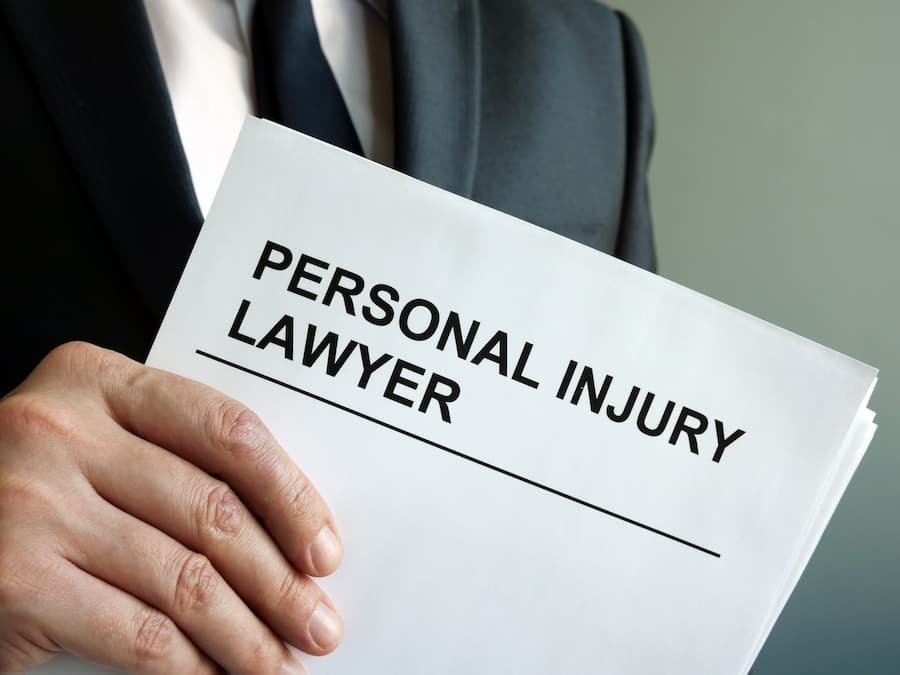Personal injury lawsuits are some of the most common civil cases in the United States, and this is not surprising. The potential for being injured by another person’s negligence is very high in everyday life, and preventable injuries requiring medical treatment are all too common.
If you have suffered an injury, your first priority should be medical treatment and physical recovery. You might need lengthy rehabilitation and therapy, requiring time away from work and ongoing medical care. The bills can pile up quickly, causing serious financial concerns.
Following such an injury and losses, understanding your rights is important, and knowing how a personal injury lawyer can benefit you is equally vital. Hiring the right personal injury attorney presents a dilemma for any victim, as there are thousands of injury law firms claiming they are ready to represent you.
How do you choose the right one?
Why Hiring a Personal Injury Lawyer is Important

Nothing can be worse than suffering a severe injury through no fault of your own; worse still, you have to focus significant time and energy on recovering. Meanwhile, trying to decipher the legal process to fight for your deserved settlement can feel almost impossible. The reality is that you should not even attempt to do so, as insurance companies know you are in a vulnerable position, and they are ready to take advantage of you.
Hiring a personal injury lawyer means you don’t have to face this scenario — they will manage the burden, leaving you the time and space needed to rebuild your life while feeling confident someone is protecting your rights.
What a Personal Injury Attorney Will Do For You
There are several reasons to hire a personal injury attorney, as they will do the following on your behalf.
Evaluating Your Case
During initial consultations and beyond, personal injury lawyers will look over every angle or factor in your claim. This allows them to identify all your legal rights and options.
Gathering Evidence
A personal injury lawyer will collect the necessary evidence to prove your case, including accident reports, medical records, and witness testimony. This is often a difficult or impossible task for an injured claimant.
Providing Legal Representation
People hire a personal injury attorney to act as their legal representative in all communications and proceedings, from insurance claims to the courtroom if necessary.
Providing Advice
Victims commonly don’t know what to do or not do when they are injured — an experienced personal injury lawyer can advise any client on how to act or what to expect.
Negotiating with Insurance Companies
The world of insurance claims is full of hardened and trained professionals aiming to prevent financial loss for the company. They use a variation of techniques to pressure claimants and undervalue a claim. Personal injury attorneys understand how to negotiate and mitigate these techniques.
Representing You in Court
While most personal injury cases settle out of court, some go the distance. An insurer may only lowball your injury settlement amount. A good personal injury lawyer should be ready to take a claim to court if this is the case.
Questions One Must Ask Personal Injury Lawyers
In reality, most injury victims have no idea how to choose a local personal injury lawyer and may not make the best choice. For example, they may choose one based on an advertisement without first researching their track record or firm resources. Your personal injury lawyer might be the most life-changing decision you make — it makes sense to choose wisely.
Every community has its share of top professionals and those who cut corners, choosing the easy option over the right one. This scenario is sadly the case with some personal injury firms that take a fast turnover, high-volume approach. Some personal injury lawyers might settle your case too early, leaving your recovery underfunded — and you with no options.
As with all important life decisions, choosing the correct personal injury attorney takes a little more effort and time. For instance, instead of simply conducting an online search, take time to schedule free consultations and speak with attorneys.
You should always ask certain questions before you make a decision, including some of the following.
What is Their Track Record?
Put simply, have they been up to the task for other clients? Hiring a personal injury lawyer without asking them about their recent successes in the field can be a mistake.
How Do They Charge?
Most personal injury lawyers take cases on a contingency basis, which is highly beneficial for clients. You can consult with the attorney for free, and they will evaluate your rights. You pay nothing to hire the attorney, and you pay nothing unless they obtain compensation for you. The firm should also front all expenses necessary to pursue your claim.
If a personal injury lawyer charges fees in any other manner, you should likely keep looking.
Can The Lawyer Afford My Case?
As mentioned, injury firms cover the costs of pursuing a case upfront. Severe personal injury cases may go on for some time, racking up significant expenses. For example, hiring specialists, key experts, and investigation teams for medical malpractice lawsuits can go into the tens of thousands. A personal injury law firm without resources or adequate cash flow can hurt your chances of a fair settlement.
What is Their Communication Style?
Does the attorney provide regular case updates or only when something major happens? Do they give clients their cell phone number or require you to go through a gatekeeper every time you have a question? There are pros and cons to different communication styles, so find a personal injury attorney with one you are comfortable with.
What Personal Injury Cases Require Representation?
Many types of negligence can lead to injuries and legal claims. Here are some of the most common types of personal injury cases where a personal injury attorney can - and should - assist you.

Medical Malpractice
Healthcare practitioners, physicians, and surgeons all have a duty of care to their patients, though sometimes, things go wrong. A victim with life-altering injuries sustained through medical malpractice can have a complicated claim.
Slip and Falls
Property owners and businesses must provide visitors with safe conditions. If you are hurt because of an unsafe environment, you may have grounds for compensation. Supermarkets, restaurants, or shopping malls are frequently the scene for such personal injury claims.
Vehicle Accidents
Careless, distracted, or aggressive driving leads to often devastating accidents. Motorists or pedestrians injured — or worse — by dangerous driving can lead to a claim requiring a personal injury lawyer.
Defective Products
Consumers might come into contact with poorly designed or manufactured products that electrocute, cut, burn, or otherwise harm the user. A product that injures a consumer can generate a lawsuit or claim.
Workplace Injuries
Accidents, injuries, and illnesses can happen on the job. While workers’ compensation claims should be straightforward, they are often anything but. Further, many work injuries can also lead to third-party negligence claims, and you want an injury lawyer to evaluate this possibility.
Animal Bites
Pet owners can be liable if their animal attacks or bites a stranger. State laws vary on dog owner liability for bites, as some hold owners strictly liable, and others require victims to prove negligence or that the dog has shown aggression before. You need an injury lawyer who knows your state’s laws.
Assault and Battery
Assault and battery also falls into the personal injury realm. While these are considered criminal acts, they can spark civil proceedings and liability for personal injury. Damages for intentional injury can be possible — even if no malice was intended.
Wrongful Death Claims
It may be that a loved one has died as a result of their injury, which is a devastating ordeal for all involved. Lost family members, such as children, parents, or spouses, can lead to devastating losses, and family members have the right to seek compensation from the liable parties. Personal injury lawyers also handle wrongful death claims, and you want a lawyer who knows the wrongful death laws in your state.
Proving Your Personal Injury Case
You might know that you have injuries and someone else caused them. However, this is not enough to get compensation. Instead, you must meet the legal requirements of personal injury law. Proving your case comes down to two basic principles: liability and damages.
A good personal injury lawyer knows how to gather sufficient evidence to prove both if you have a valid claim.
Proving Liability
Liability in an injury claim usually depends on another party’s negligence. There are four main elements of negligence that a personal injury lawyer will show in an injury claim:
- Duty of care: The party must have owed you some duty of care due to your legal relationship in the scenario.
- Breach of duty: The party failed to uphold their duty of care by acting carelessly, recklessly, or intentionally wrongfully in some manner.
- Causation: There must be a link between a party’s breach of duty of care and your injury.
- Damages: You must have sustained damages as a result.
Your word that someone else is to blame is not enough. Rely on an experienced attorney to gather evidence to prove the elements of negligence and liability in your claim.
What Damages Can a Personal Injury Attorney Win for Me?
Once your attorney proves liability, they must prove your damages. Keep in mind that not all damages are the same. There are economic and non-economic damages, and even punitive damages may also be part of your personal injury case.

Economic Damages
Economic damages refer to all losses relating to financial losses, as well as other costs sustained after the injury. These damages are easily measured and usually come with documentation. Examples include:
- Medical bills
- Property damage
- Transportation costs to and from the hospital
- Lost income
- Lost future earnings because of the injury
- Lost sick leave or paid vacation time
Non-Economic Damages
Non-economic damages are much harder to measure, though medical records and personal testimony can help determine the amounts. These are damages involving personal loss of life quality. These might include:
- Emotional loss
- Pain and suffering
- Lost activities and hobbies
- Inability to play sports and exercise
- Loss of enjoyment of life
Punitive Damages
Punitive damages are linked to intentional harm or gross negligence that led to your injury. These damages are only available if your case goes to court, so your personal injury attorney will assess whether this is a possibility in your case. Punitive damages do not correlate with any losses you have but instead mean to punish the wrongdoer further.
Keep in mind that insurance companies will try to undervalue your losses, and they will not simply believe you when you state what you believe what your claim is worth. Instead, your personal injury lawyer must provide evidence to support the settlement amount you are demanding.
How The Right Personal Injury Lawyer Adds Value to Your Claim
An injured victim’s main objective is to seek full compensation to cover their losses. Hiring the correct personal injury attorney will bolster this objective in the following ways.
Handle The Complex Legal Process
Any legal process can be overwhelming for the layperson. The greatest benefit a personal injury lawyer offers is navigating complicated procedures for their client.
Keep An Objective Position
The post-injury period is a highly charged time for the victim and their families. Making legal decisions based on emotion can be detrimental to the outcome of the claim.
Getting the Best Possible Compensation

A personal injury lawsuit involves many challenges, like tracking expenses and presenting enough evidence to win the maximum settlement. Insurance companies will fight to minimize compensation, and adverse parties might try to conceal key evidence. A lawyer will advocate for their client’s position, always negotiating for the most compensation available in the particular situation.
Some personal injury cases can have high stakes. However, even if you believe your injuries are relatively minor, you still deserve someone fighting for your rights.
If you have suffered a personal injury because of someone else’s negligence, you should consult a personal injury lawyer today. Case evaluations are free.
